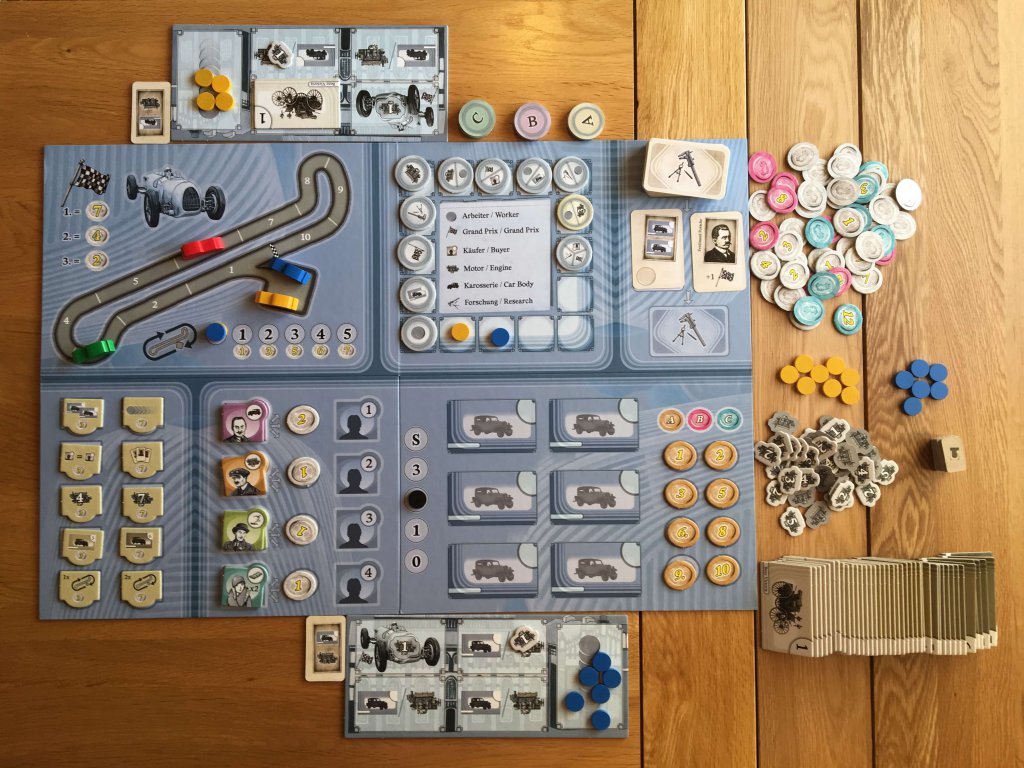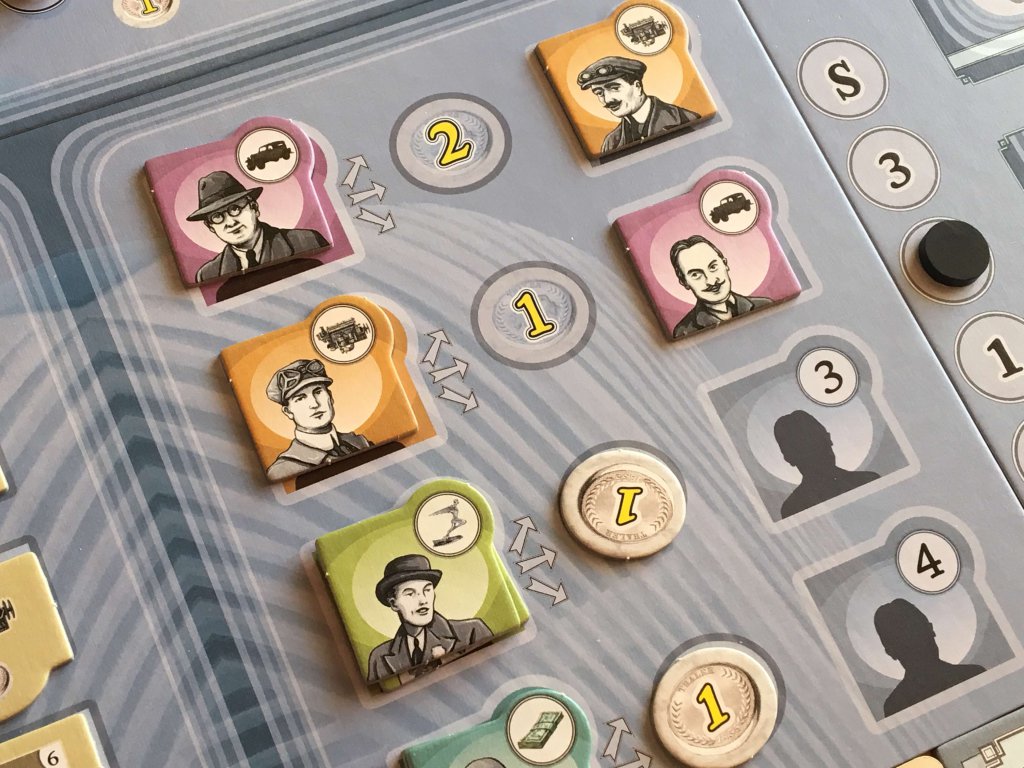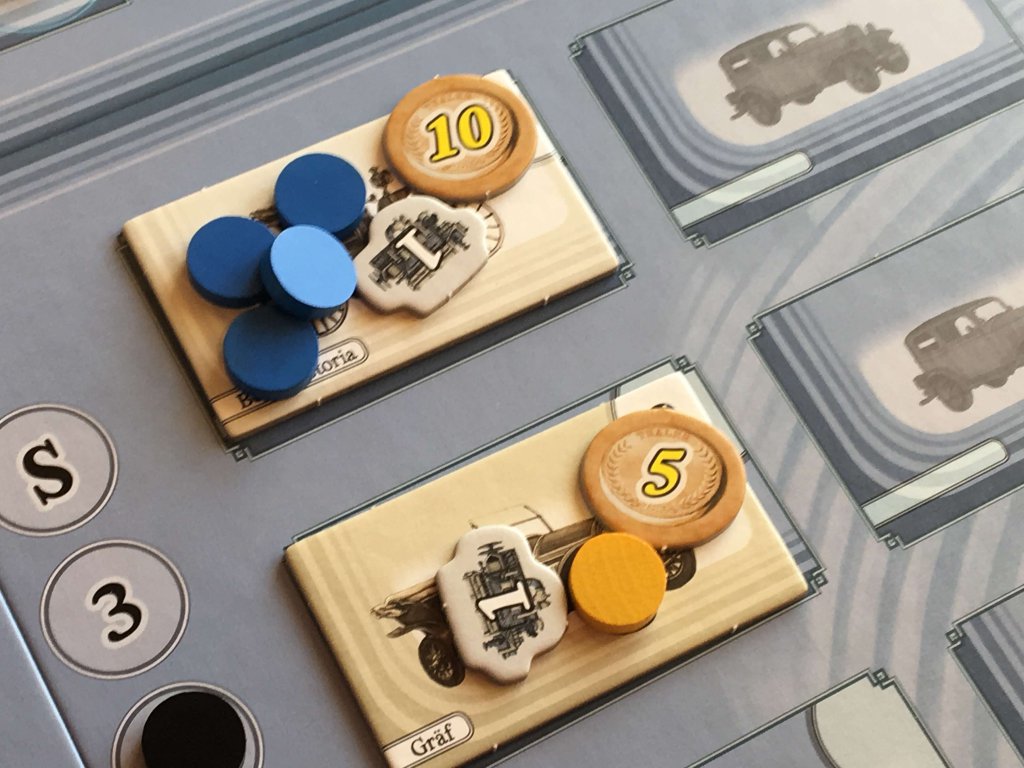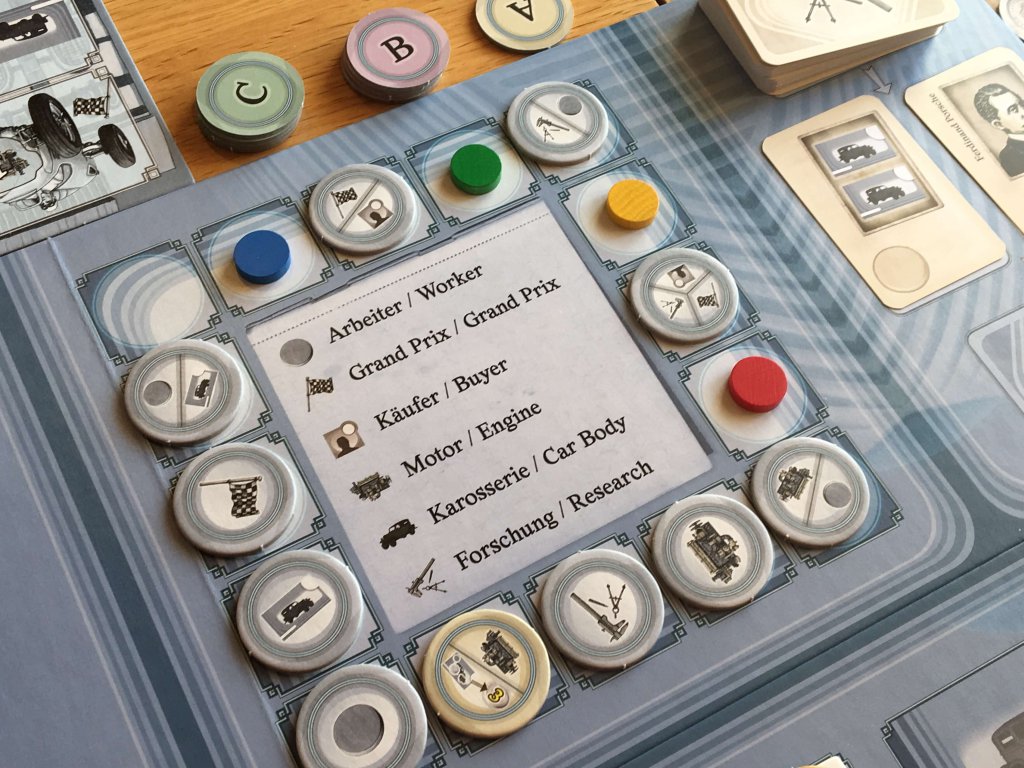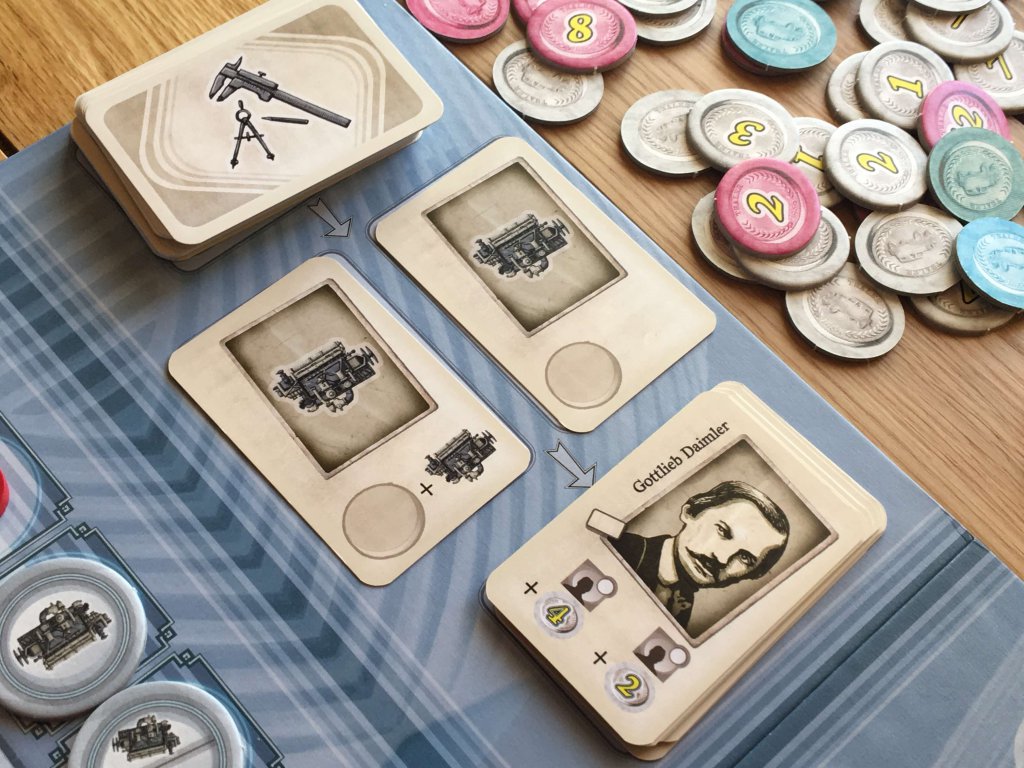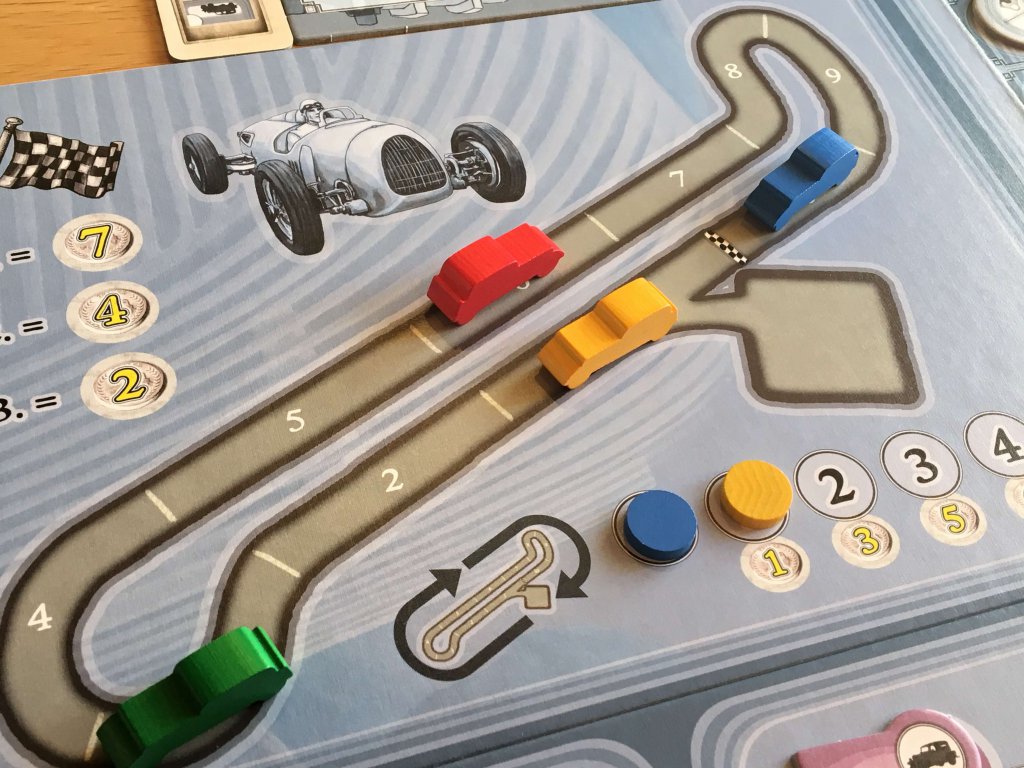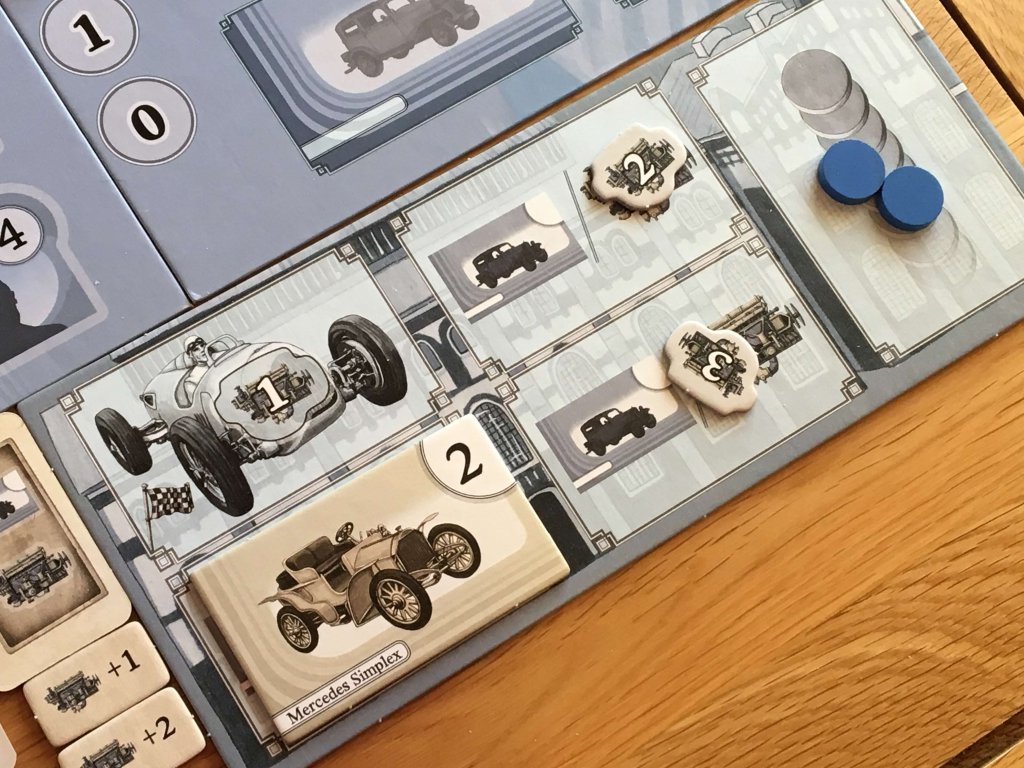In Kraftwagen, each player is a car company mogul during the halcyon days of the early 20th century. The players will obtain victory points by building desirable car bodies, adding powerful engines and investing in race day technology. Which strategy will prove to be most effective though? Only time will tell.
Kraftwagen is a smart, roundel-based game from revered designer Matthias Kramer and original publisher ADC Blackfire Entertainment. As a testament to its quality, the game was recently picked up for broader publication by Stronghold Games, who have a reputation for seeking out the very best independent games and bringing them to the big stage.
In truth, Stronghold Games backing should be enough to indicate that Kraftwagen is a quality title, such is their track record with similar games (Terraforming Mars, Flamme Rouge and A Thief’s Fortune.) But if you did have any doubt, let me explain why Kraftwagen is a brilliant game and possibly one of the best examples from a genre you may not have known existed.
So what exactly is a roundel-based game? Simply put, roundel games allow players to take actions by following a circular path of some sort. In Kraftwagen, this path includes a number of different action tiles that begin (at the start of the game) with less powerful, single action tiles and end with tiles that allow two or even three actions to be taken.
The idea here is that if a player skips ahead to take a more powerful tile, then they will have to wait for their opponents to catch up with them (often taking multiple actions in the process.) This is because most roundel games (including this one) use a system whereby whichever player is furthest back on the roundel will always be the next player — even if they were the most recent to act.
I’ll also pause here for a moment to mention the only difference between the base version of Kraftwagen and the V6 Edition, which is simply that the V6 Edition comes with a handful of additional roundel tiles. Whilst I’m not going to focus on these further in this review, the expansion tiles are broadly a bit more powerful than those in the base game, increasing the speed at which the players develop and resulting in a higher scoring game.
In terms of the actions that the roundel enables, each one relates to a different area of the board — there are quite a few of them. The Hire Workers symbol allows the player to take one (or sometimes more) workers from their canteen, which is important for certain other actions. The Grand Prix action allows the player to advance their race car a number of spaces equal to its engine value.
There are several other actions, including Research, which involves drawing one of the two face up research cards and taking the benefit shown and two actions relating to construction. Players can choose the Engine or Car Body actions to build the part in the level that matches their current research level. Perhaps most importantly, players can take the Buyer action to introduce a new buyer to the car market.
When this action is taken, the player will choose one of the four kinds of buyer to bring to the market. Each buyer has a different preference — Price, Engine, Car Body or Service. If all of the four active buyers have already been placed, then instead, a marker next to the buyers is moved down, signalling that the game is one step closer to one of the three scoring events.
There are several ways to score points in Kraftwagen, including numerous awards for things like being first to construct an engine of a certain level or perform a set number of laps on the Grand Prix circuit. The main one, however, is through the buyers market. Success on the Grand Prix circuit serves to increase the prestige for your brand, but it is nowhere near as important as selling cars to the general public.
This is both a thematic representation of the car market during the 1920’s and 1930’s, as well as a mechanical reality in Kraftwagen. What really brings the game to life is the different needs of the buyers — some value speed, while others appearance. Some want exceptional after sales support or a low price. The key to victory is in both bringing these people to market and ensuring that your cars meet their needs.
As hinted at earlier, the players can advance their research or even hire famous mechanics and inventors (like Ferdinand Porsche), who add to the capability of their brand. When a player has constructed an engine and a car body, they may introduce their car to the market and set the price. At this point, they’ll need to allocate a number of workers to their service department, which ties them up but also ensures delighted customers.
An interesting part of every scoring round in Kraftwagen is seeing how the buyers market builds up and how the cars are added to it. Some players will prioritise cars first, adding buyers that suit those cars later. Otherwise will select the buyers that they hope will suit cars they haven’t yet built. Either approach comes with the risk of other players swooping in with a faster, better looking or cheaper car.
For me, Kraftwagen represents the pinnacle of smart, elegant game design. The roundel system is interesting and unusual, bringing its own challenges and decisions. Kraftwagen really comes alive on the board though, especially when players begin to understand the real-life parallels between factors like Grand Prix performance and how it affects buyers behaviour. Most importantly, whilst the decisions are often big and important, the mechanics are simple to teach and play.
If there’s one downside to Kraftwagen, it is perhaps the components and maybe, to a lesser extent, the setting. As a car fan, I feel more drawn towards modern cars than I do historic ones, however I do appreciate that this is a very personal aspect and won’t affect everyone.
More importantly, Kraftwagen has a clean, understated look that works very well technically, but is perhaps a bit boring compared to some other games. With that said, function should always win over form and I am by no means criticising the build quality (which is superb) merely some of the visual aspects such as the colours and design features.
Despite this one minor criticism (and possibly because of it), I really think Kraftwagen is one of the most understated games that I’ve played this year. It’s simple, smart, well paced and pleasantly thought provoking. The fact that it does use older cars means that it has broad appeal and can impress players from all age groups and more or less any experience level, although it is by no means a light game. Overall, a definite keeper for me.
Kraftwagen V6 Edition is available for purchase right now, including on Amazon. You can find out more about it here.
Love board games? Check out our list of the top board games we’ve reviewed.

